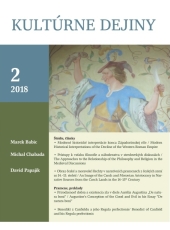Moderné historické interpretácie konca Západorímskej ríše. Zánik alebo komplexná kultúrna transformácia?
Modern Historical Interpretations of the Decline of the Western Roman Empire. Fall or Complex Cultural Transformation?
Author(s): Marek BabicSubject(s): History, Cultural history, Ancient World
Published by: VERBUM - vydavateľstvo Katolíckej univerzity v Ružomberku
Keywords: Western Roman Empire; the end of antiquity; historical interpretation; cultural transformation; late antiquity;
Summary/Abstract: The study examines the importance and impact of specific cultural contexts in the modern era within the historical interpretation of the fall of the Western Roman Empire. At the beginning is examined the long-standing discussion among historians about the determination of a specific period in which the ancient Roman Empire ended. The study defines the most important questions that emerged from this discussion, and the various responses of selected mind-forming European and American intellectuals from the second half of the 18th century to the present day. The study specifically explores the conscious and unconscious ideological prejudices, the cultural environment at a specific time and territory, and the life experiences that individual historians have projected into their concepts in an attempt to offer satisfactory answers to one of the most important events in the history of the Western civilization. The historical interpretation of the end of the Western Roman Empire is one of the greatest challenges of modern historiography. Since the time of Edward Gibbon, the intellectual debate has gradually focused on addressing a number of key issues: When the Roman Empire ceased to exist, what were the causes of the demise, and what were the consequences for the following history in Mediterranean territory? The study points out that the answers to these questions largely depended on the civilization level and the cultural context in which individual historians formed their theories. Since the mid-19th century, some historians, such as A. Dopsch, rejected the search for the particular year of the demise of the Western Roman Empire. This attitude was based on a new understanding of the material culture of late antiquity in the second half of the 19th century, thanks to the significant development of archeology during this period. On the basis of comparative archeology, Dopsch emphasized the continuity between ancient and medieval times. The concept of “Long Late Antiquity” offered a wider range of interpretations of the demise of the Roman Empire in the Mediterranean. In the second half of the 19th century, the inter-war debate took place between French and German historians who sought to justify the historical claims on the borderland between France and the recently united Germany. A significant challenge was then to evaluate the importance of Germanic migration at the end of the Roman Empire. Nor Fustel de Coulanges, a French positivist historian who has been scrupulously striving to separate scientific research and nationalism, has not been resistant to ideological prejudices in this case. At the beginning of the 20th century, historical science in the issue of the late Roman Emperor was greatly influenced by Mommsen’s historical-critical method of gathering and studying sources and by Darwin’s evolutionary theory. Social Darwinism penetrated the historical analyzes of O. Seek and F. Tenney, who explained the decline of the Roman Empire by infiltration of the absolutist methods of governance from the Orient that caused a regression of political and social development. The first and second World war meant for many opinion-makers historians a disillusionment of faith in civilization progress. Authors often did not know how to evade their frustrations from the Second World War. P. Courcelle divided his work on Germanic migrations into three parts – the invasion, the occupation, the liberation, which basically duplicates the course of the 2nd World war in France. In the 1950s and 1960s, the generation of historians, headed by P. Brown, consciously separated from the interpretation of the late antiquity as a period of decadence, and instead set the concept of continuity between the classical antiquity and the medieval period. Scientific research focused on the eastern parts of the Roman Empire, where state institutions continued to function within the Byzantine Empire. The key to understanding of historical processes between the 4th and 7th centuries, was the study of marginalized literature which was able to provide a new knowledge of the cultural vitality of the time. In the second half of the 20th century, epithets, such as transformation, evolution, continuity instead of extinction or fall, are mostly used in the professional circles for the period of late antiquity. The last decades of the 20th century and the beginning of the 21st century is characterized by the term “Archaeological Revolution”. Thanks to the new discovery, a number of long-lived clichés are reinterpreted on the issues of the end of Roman state institutions in the West and East. Historical science does not capitulate for searching answers to the issue of the end of Roman power in the Mediterranean. This is evidenced by several major European and American projects, such as “The Transformation of the Roman World”. However, due to the relatively small amount of literary sources preserved from this period, there is still considerable room for introducing our own cultural context into the historical interpretation of this epochal process.
Journal: Kultúrne dejiny
- Issue Year: 9/2018
- Issue No: 2
- Page Range: 168-181
- Page Count: 14
- Language: Slovak

